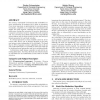Free Online Productivity Tools
i2Speak
i2Symbol
i2OCR
iTex2Img
iWeb2Print
iWeb2Shot
i2Type
iPdf2Split
iPdf2Merge
i2Bopomofo
i2Arabic
i2Style
i2Image
i2PDF
iLatex2Rtf
Sci2ools
112
click to vote
CASES
2007
ACM
2007
ACM
Stack size reduction of recursive programs
For memory constrained environments like embedded systems, optimization for program size is often as important, if not more important, as optimization for execution speed. Commonly, compilers try to reduce the code segment and neglect the stack segment, although the stack can significantly grow during the execution of recursive functions as a separate activation record is required for each recursive call. An activation record holds administrative data like the return address and the frame pointer but also the function's formal parameter list and local variables. If a formal parameter or local variable is dead at all recursive calls, then it can be declared globally so that only one instance exists independent of the call depth. We found that in 70% of popular recursive algorithms and in all our real world benchmarks, it is possible to reduce the stack size by declaring formal parameters and local variables globally. Architectures might impose a penalty in code size for accessing ...
Related Content
| Added | 12 Aug 2010 |
| Updated | 12 Aug 2010 |
| Type | Conference |
| Year | 2007 |
| Where | CASES |
| Authors | Stefan Schäckeler, Weijia Shang |
Comments (0)

